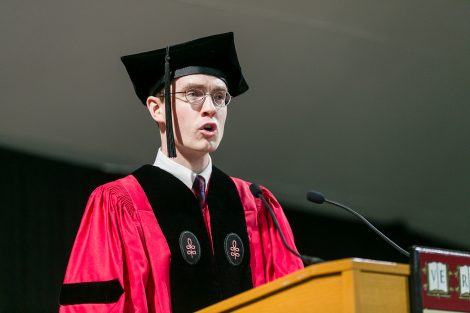Greetings to Dean Williams, distinguished guests, faculty, staff, and alumni. Congratulations to the class of 2019 and to our parents, friends, and loved ones, without whom we would not have reached this day.
Last year I participated in a Winter Session field course in Fortaleza, Brazil during which we visited a community health and social development center named Quatro Varas, located in a poor neighborhood just steps from the Atlantic Ocean.
The center’s founder, Dr. Adalberto Barreto, told us that Quatro Varas means “four sticks”. He then told us a legend about an elderly man who, nearing the end of his life, gathered his four sons together. He asked each one to pick up a stick—and then showed that he could easily break each stick. But when all four sticks were bound together, they could not be broken. He had few material resources he could leave his sons, but he gave them a vital lesson: If they stuck together through life’s challenges, they would never be broken.
In a sense, this is also the story of our school and of the field of public health. The public’s health is shaped by many factors, from the genes inside each individual, to the powerful systemic social, political, and economic forces that shape the worlds we live in. As a result, we need to draw on insights from a vast array of disciplines.
As an epidemiologist, I need molecular biologists and social and behavioral scientists to help me identify what exposures are important and how they relate to each other. I need to work with experts at implementing health programs to determine what research questions most need to be answered in order to improve interventions.
No one person can be expert in all areas: we need each other.
There is also another sense in which Quatro Varas should guide our life in public health: From its founding, it has worked from the premise that all people and all communities have strengths. At its core, Quatro Varas is a space where people can contribute their own knowledge and collaboratively find their way to solve community problems. In public health there is a risk that we see communities facing heavy burdens as solely that—communities with problems. But we’ll never find a community’s strengths if we assume there aren’t any.
To maximize our effectiveness, we must partner with the people we hope to serve. From a Fortaleza favela struggling to overcome cycles of youth violence, to a village along the Congo River facing an Ebola outbreak, to a town in rural Indiana struck by a dual crisis of opioids and HIV, outside experts trying to help such communities will fail unless they earn the trust of community members.
And earning trust is hard, especially in a world where there’s a long-running trend of declining trust in nearly all institutions.
But there is a path forward. Dr. Adalberto emphasized that humility is the key to working together across disciplines and ideological perspectives.
Humility doesn’t mean abandoning what we know. But it does mean acknowledging the limits of our own knowledge and our own perspectives. We have become experts on many topics, but let’s never forget that people are experts on their own lives, their own communities, and their own values and priorities.
I hope that wherever life after Harvard takes us, we’ll not only carry with us everything we have learned here, but also an abiding realization that there’s so much more we do not know. With this perspective we will be able to pick up the sticks each of us contributes and bind them to those contributed by our fellow citizens living in communities near and far.
Working together—with each other and with the public—we will advance the public’s health, far more than we could do alone.
Thank you and godspeed.
Photo: Josh Levine
